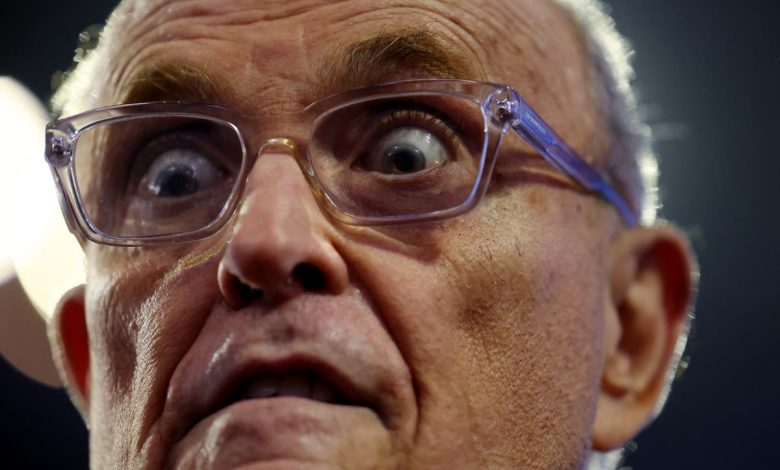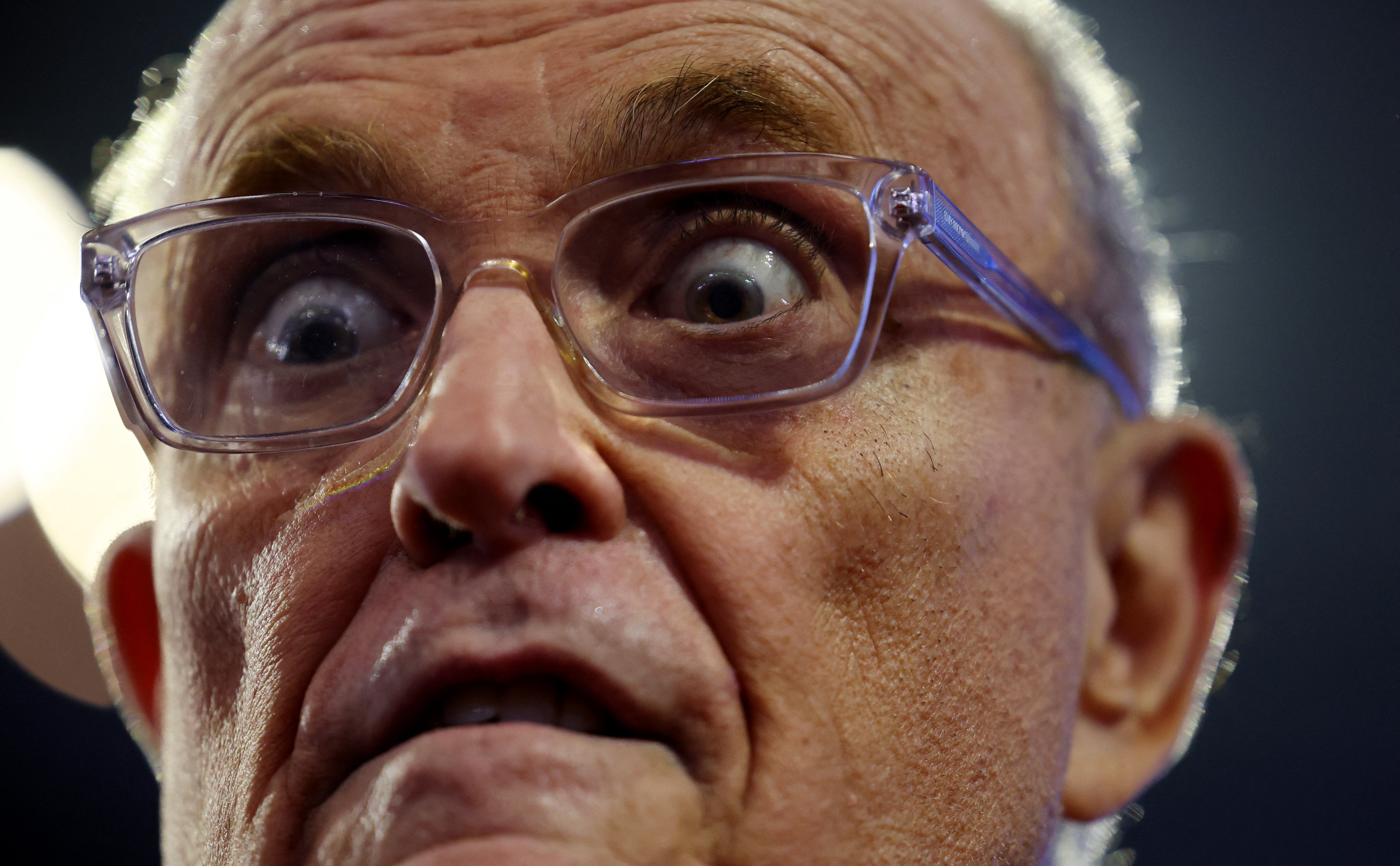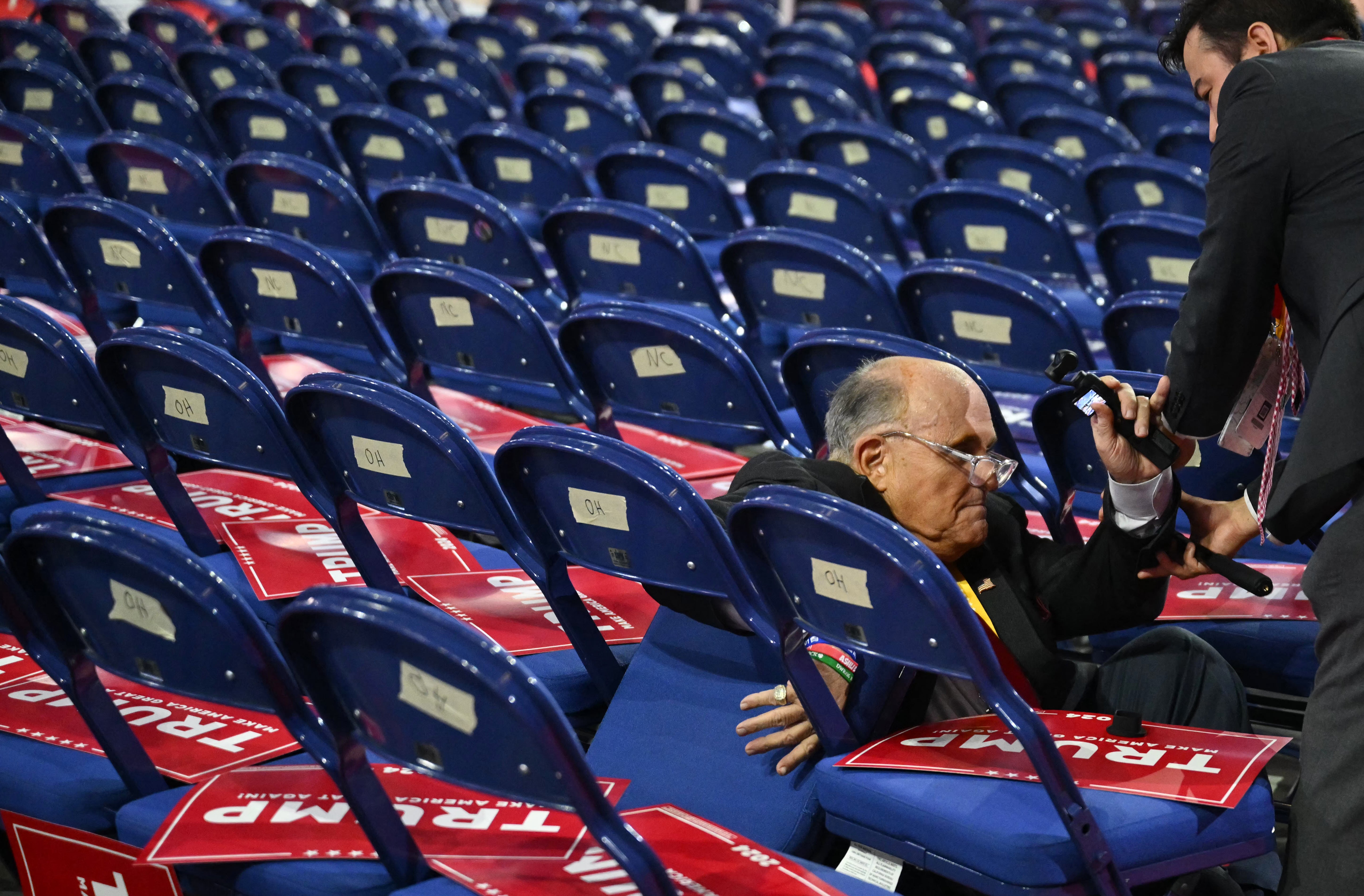Rudy Giuliani blows through $30K in seven days since last bankruptcy hearing

Cash-strapped former New York City mayor Rudy Giuliani spent about $30,000 in the one week since a judge threw out his bankruptcy case.
The Wednesday afternoon hearing revolved around the terms of the dismissal of Giuliani’s Chapter 11 bankruptcy case, which a Judge Sean Lane ordered on Friday, July 12.
Lawyers for Giuliani and his bankruptcy creditors were trying to figure out how the former mayor would pay the administrative fees that have incurred throughout the case — but the terms hinge on how much Giuliani had in his bank.
Giuliani’s bank statement from just one account revealed that he had spent about half of the $60,000 that he had since the last hearing on July 10.
“About half of the debtor’s cash in this one account alone has been dissipated” since last Wednesday’s bankruptcy hearing, Rachel Strickland, lawyer for the defamed election workers, told the court after reading the statement.

The former mayor spent an unknown sum of cash at the Republican National Convention in Milwaukee — where he was seen falling over — but most of it went toward expenses for his two homes, Strickland said.
A check for $14,000 for New York condo expenses and a wire transfer for $25,000 for the Florida condo association were sent since the July 10 hearing, Strickland said. There were also a series of “relatively small charges” to marketing firms, as well as to Amazon and Apple, she said. The exact sum spent on the other expenses is not immediately clear.
“The debtor, I think, is up to Giuliani shenanigans yet again,” the lawyer continued. She also told the court that she had requested statements from all of his bank accounts. That account is his “main checking account,” one of his lawyers clarified to the court.
The amount in the accounts was a crucial point of the hearing, since Strickland had proposed that the dismissal order require Giuliani to pay the amount that is in his accounts be required to fund the administrative expenses.
“Debtor’s counsel said he doesn’t have that much money. So we weren’t quibbling with the concept of getting blood from a stone,” Strickland said.
“Instead, we proposed that we look at his bank accounts, the ones that are property of the estate as of July 11…Whatever it is in cash that should come right off the top,” she argued.
Earlier in the hearing, the judge asked Strickland what she understood to be the amount in Giuliani’s bank account.
“I don’t have an understanding because this is not a debtor that is remotely forthcoming,” Strickland said. She then asked Giuliani’s financial records on the date of dismissal to be used to pay admin fees because bank “statements don’t lie.”
Creditors “want to denude the debtor of every liquid asset for cash on hand that the debtor needs to operate going forward,” said Gary Fischoff, a lawyer for Giuliani.
“Your client holds the key,” Judge Lane said. “I don’t want to hear he’s hard to get in touch with, I don’t want to hear that any of this is a surprise. People have been trying to get all the same information for many months.”
“It’s the same song over and over again,” the frustrated judge said in terms of Giuliani’s lack of transparency around his assets. “Even a dismissal, which your client wants, you can’t get out of your own way.”
The judge then told Giuliani’s lawyers: “I strongly, strongly urge you and your client to sit down and figure out what you really want the end game to look like here.”

Judge Lane said he’s a “patient man” and has tried to be “reasonable,” but threatened: “There are ways to do this that include requiring your client to come in and sit in that box over there and have a discussion about the available liquid assets that can be used to pay these professionals. So does your client want to do that?”
At the end of a hearing that spanned an hour-and-a-half, Judge Lane said the fact that “no one has thought about what the next steps are, is frankly unbelievable and uniquely unhelpful.”
He then directed the former mayor’s lawyers to update the other lawyers before 11am on Thursday. Then by “high noon, appropriately theatrical,” he asked for an update to be filed on the docket and then he will make a decision on the order.
Complaints about Giuliani’s lack of transparency are not new in the seven-months-long bankruptcy case.
The judge wrote in a scathing filing that the court’s record “reflects Mr Giuliani’s continued failure to meet his reporting obligations and provide the financial transparency required of a debtor in possession.”
The judge added: “The lack of financial transparency is particularly troubling given concerns that Mr Giuliani has engaged in self-dealing and that he has potential conflicts of interest that would hamper the administration of his bankruptcy case.”
After Strickland proposed an order, Fischoff called the proposed terms “onerous, punitive, and overreaching” in a July 15 letter to Judge Lane. The creditors “want it both ways,” Fischoff wrote. “They want the case dismissed while they also exercise complete control over” Giuliani.
Following the objection, Giuliani’s legal team met with Strickland, who came to the conclusion: “We are even more concerned that Mr Giuliani has more shenanigans up his sleeve.”
So, she offered up a counter proposal that takes into account the fact that his Manhattan condo “does not appear close to being sold despite being on and off the market over the past year” and tha Giuliani “seems keen to avoid paying the freight he incurred by filing a voluntary bankruptcy petition.”
At Wednesday’s hearing, Fischoff said that the Upper East Side condo is “actively being marketed,” adding that Sotheby’s and Giuliani might have to consider a “price reduction” on the unit. The price of the Manhattan place has already been slashed significantly since it was first put on the market nearly a year ago.







